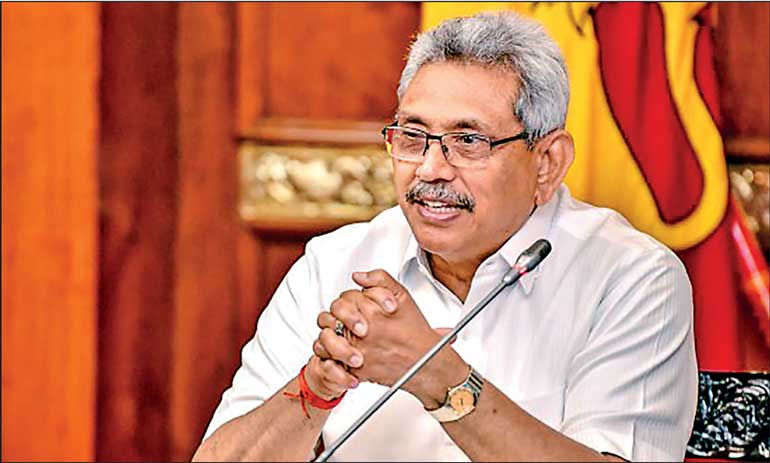Thursday Feb 19, 2026
Thursday Feb 19, 2026
Friday, 8 October 2021 00:00 - - {{hitsCtrl.values.hits}}

It all started with President GR’s grandiose scheme to bring local food production and the environment chemical and carbon free – a noble objective indeed to save the planet. The problem, however, was that he never did his homework regarding the methodology of translating that objective into reality
|
 Since the Rajapaksa brothers were brought to power since 2019, and with the onset of an economic depression, management of the country’s economy has fallen into disarray and become a laboratory for experimenting uncoordinated policies emanating from President GR’s thought bubbles and pushed through by his Viyath Maga experts.
Since the Rajapaksa brothers were brought to power since 2019, and with the onset of an economic depression, management of the country’s economy has fallen into disarray and become a laboratory for experimenting uncoordinated policies emanating from President GR’s thought bubbles and pushed through by his Viyath Maga experts.
Overall, economic management in this challenging environment has become an art of winning political battles rather than a systematic exercise based on public consensus and pragmatic thought. Nothing highlights this serious shortcoming more clearly than the politics over rice production and its pricing.
It all started with President GR’s grandiose scheme to bring local food production and the environment chemical and carbon free – a noble objective indeed to save the planet. The problem, however, was that he never did his homework regarding the methodology of translating that objective into reality.
Being a leader who was schooled in the military art of command and obedience he ignored the need to consult experts on this unfamiliar subject. As part of his policy of import substitution, he announced at once an outright ban on the import of chemical fertilisers and ordered immediate switch to the use of organic fertiliser. An underlying mismatch between organic fertiliser and prevailing agricultural practice did not enter his mind.
After decades of cultivating paddy that responded favourably to a package of chemical inputs including fertiliser, the call to switch to organic fertiliser came as a shock not only to paddy farmers and rubber producers but also to agronomists and other related scientists.
There were two practical issues that made implementation of the switch problematic. One was the need for seed paddy that would respond favourably to organic inputs, and the other was suitability of the soil that had gone through decades of transformation through the use of chemical inputs. Agronomists and specialists pointed out these facts but in vain. Authoritarian GR ignored all criticism and maintained that he was a man of action with a grand vision for prosperity and resplendence.
To overcome the shortage of domestically-produced organic fertiliser imports were permitted with an eye on importing the whole lot from China. Won’t that settle some of the huge financial debt that Sri Lanka owes to that country? However, when laboratory testing was done on a sample it was found that the bacteria contained in the Chinese product would be harmful to Sri Lankan soil. Would the researchers also divulge what ingredients had gone into the manufacture of that fertiliser? However, that import has been stopped.
What about seed paddy? The pre-Green Revolution varieties of seed are no more in use and the ones sown today by local farmers are adapted to agrochemical inputs. Will the same variety respond to the switch with equal efficiency? The country would have to wait for the Maha season yield to see how fitting organic fertiliser would be with existing soil conditions. In any case, authoritarian politics has overruled economic pragmatism.
Nowhere else has political considerations played such a critical role in decision making under this regime as in the recent fiasco over Government’s attempt to introduce price ceiling for different varieties of the staple. These ceilings were introduced in March 2020 and revised three times since then.
It is a proven fact in economics that price ceilings in free markets produce black marketing. But what made it worse at present is the operation of a mafia in domestic rice market. This mafia has its power base in the country’s north-east, and has its influence entrenched through its representatives in the national Legislature. Those representatives are a vital component of the ruling Rajapaksa coalition.
In trying to demonstrate the Government’s power to control the mafia, it took the bold step in September to send the Army to confiscate around 1,000 metric tons of rice from the mills in Polonnaruwa, and sold it at the officially fixed ceiling price through its chief distributive agency, Sathosa. The mafia has now decided to counteract and show its strength by announcing its own retail prices.
The Government, realising the political cost of confronting the mafia, has withdrawn its price ceiling and resorted to import 100,000 metric tons of rice to bring down the price at home. This makes it clear that the mafia’s political clout inside the Legislature prevents the rulers to free the market from hoarders and mafia moguls. The Government has neither the resolve nor the capacity to remove artificial rigidities in domestic rice market.
This is again made clear by the new Governor of CBSL, Nivard Cabraal, when announcing his short-term program for stability and growth. His appealing to the patriotic sentiments of retailers and wholesalers not to hoard and corner the market for essential items and earn supra-normal profits. Of what use is this appeal when hoarders, racketeers and market manipulators are part of the ruling power cartel?
Most of Sri Lanka’s economic problems today are political in origin and the blame should not be conveniently shifted to the pandemic and worldwide depression. Rice and rice pricing is emblematic of this politics.
Incidentally, the recently-published Pandora Papers reveal how unashamedly corrupt some members of the ruling family have become, and to expect a political set up operating under its leadership cannot be expected to revive the economy in the interest of the people.
The logical solution therefore is to bring about a political change. But pathetically, the current Opposition is in such disarray, shouting with empty promises without any alternative program, the status quo is destined to continue despite its internal squabbles and occasional turbulence. But how long will the people put up with this disaster?
|
(The writer is attached to the School of Business & Governance, Murdoch University, Western Australia.)